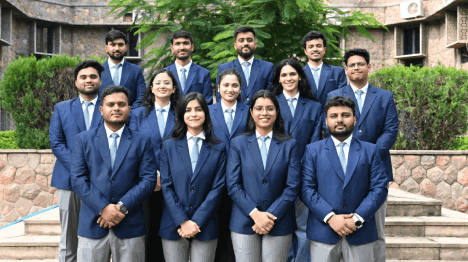- About Us
-
Academics
Schools
Programs
General Information
-
Faculty
The faculty members and researchers working at IIHMR University come from varied backgrounds including, but not limited to medicine, public health, management, economics, statistics, demography, human geography, social and behavioral sciences, rural development and pharmaceuticals.
-
Admissions
- Research
Publications & Journal
- Executive Education
Executive Programmes
- Online Certification Courses
ONLINE CERTIFICATION Courses
- Training
- Placements
- Contact
- Pradanya
- Blog
- Fee Payment
- NAAC
- IQAC
- NIRF
-
About Us
- About IIHMR University
- Board of Management
- Academic Council
- Board of Studies
- Research Board
- Institutional Review Board
- Finance & Audit Committee
- Departmental Research Committee
- Chairperson's Message
- President's Message
- IIHMR University Act
- Infrastructure
- Collaboration
- Ranking
- Board of Studies (School of Digital Health)
- Awards & Accolades
-
Academics
- Institute of Health Management Research
- School of Pharmaceutical Management
- ML Mehta School of Development Studies
- School of Digital Health
- SD Gupta School of Public Health
- MBA (Hospital and Health Management)
- MBA (Pharmaceutical Management)
- MBA (Development Management)
- MBA (Healthcare Analytics)
- Master of Public Health
- Student Manual – Cohort 9 (2021-2023)
- Master of Public Health (Offered by Johns Hopkins Bloomberg School of Public Health, USA in cooperation with IIHMR University, Jaipur, India)
- Ph. D.
- MBA CSR & ESG Management (Executive)
- MBA Sustainable Business Management (Executive)
- Common Information for all the Programs
- Academic Calendar
- Student Handbook 2020-21
- Committees
- Policies
- Annual Exam Calendar
- Library
- Faculty
- Officers of University
- Dean of Institute of Health Management Research
- Dean of School of Pharmaceutical Management
- Dean of School of Development Studies
- Dean of SD Gupta School of Public Health
- Dean of School of Digital Health
- School of Digital Health
- Faculty List A to Z
- Faculty List Designation Wise
- Faculty List School Wise
- Admissions
- Research
- Executive Education
- Training
- Placements
- Alumni
- Events
- Job Openings
- Contact
- Research
Dr. Swapnil Gadhave
Dr. Swapnil Gadhave
Assistant Professor
Dr. Swapnil Gadhave holds Ph.D. and M.Sc. in Health Sciences from Pune University and along with Bachelor in Homeopathic Medicine from Maharashtra University of Health Sciences, Nashik. His academic achievements also include securing the UGC NET lectureship in Social Medicine and Community Health.
In addition to his strong academic background, Dr. Gadhave has further honed his skills through a Postgraduate Certificate in Clinical Research and Data Management from Department of Bioinformatics from Pune University. He has pursued advanced training in Digital Health and Medical Imaging at the prestigious Indian Institute of Science (IISc) in Bengaluru.
Dr. Gadhave's professional journey spans over a decade, during which he has significantly contributed to several health research projects across the spectrum of Public health. He was co-investigator for ICMR funded Systematic review and metanalysis project on Maternal and child health. Furthermore, Dr. Gadhave has made substantial contributions to academia through his more than a dozen workshops related to research methodology conducted across India. He Authored and co-authored 18 publications in various prestigious journals.
His dedication and expertise have been recognized through awards such as the Mr. Sharangdhar Purushottam Kanhere Prize, which he received for the Best Research Paper on Community-Based Interventions and the Use of Appropriate Technology at the Maharashtra IPHA & IAPSM Joint Conference in 2015.
In addition to his scholarly accomplishments, Dr. Gadhave is a passionate advocate for the integration of AYUSH (Ayurveda, Yoga and Naturopathy, Unani, Siddha, and Homoeopathy) into the public health system. He is also dedicated to promoting the concept of dewesternization in the field of public health. His advocacy revolves around the idea of adopting a holistic approach to healthcare, which includes traditional and complementary medicine systems. This approach emphasizes the importance of aligning health practices and policies with the cultural and social context of India, thus fostering a more indigenous and culturally attuned approach to public health.
Core strength
Application of Artificial Intelligence and Machine Learning tools for health promotion, Behaviour change and Disease diagnosis, E-Health literacy, Real time surveillance of infectious diseases Quantitative and Qualitative Research, Healthcare analytics.




